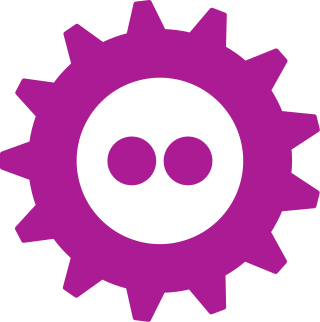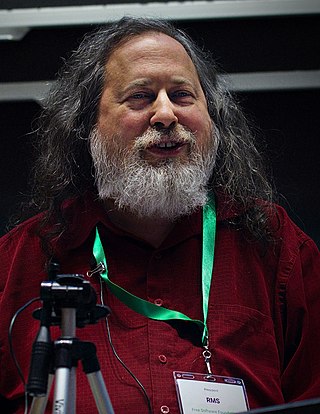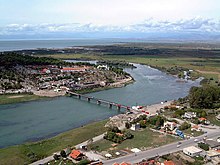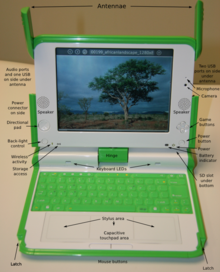
Free software or libre software is computer software distributed under terms that allow users to run the software for any purpose as well as to study, change, and distribute it and any adapted versions. Free software is a matter of liberty, not price; all users are legally free to do what they want with their copies of a free software regardless of how much is paid to obtain the program. Computer programs are deemed "free" if they give end-users ultimate control over the software and, subsequently, over their devices.
The free software movement is a social movement with the goal of obtaining and guaranteeing certain freedoms for software users, namely the freedoms to run the software, to study the software, to modify the software, and to share copies of the software. Software which meets these requirements, The Four Essential Freedoms of Free Software, is termed free software.

The GNU Project is a free software, mass collaboration project announced by Richard Stallman on September 27, 1983. Its goal is to give computer users freedom and control in their use of their computers and computing devices by collaboratively developing and publishing software that gives everyone the rights to freely run the software, copy and distribute it, study it, and modify it. GNU software grants these rights in its license.

Open-source software (OSS) is computer software that is released under a license in which the copyright holder grants users the rights to use, study, change, and distribute the software and its source code to anyone and for any purpose. Open-source software may be developed in a collaborative public manner. Open-source software is a prominent example of open collaboration, meaning any capable user is able to participate online in development, making the number of possible contributors indefinite. The ability to examine the code facilitates public trust in the software.

Free Software Foundation (FSF) grants two annual awards. Since 1998, FSF has granted the award for Advancement of Free Software and since 2005, also the Free Software Award for Projects of Social Benefit.

Free and Open source Software Developers' European Meeting (FOSDEM) is a non-commercial, volunteer-organized European event centered on free and open-source software development. It is aimed at developers and anyone interested in the free and open-source software movement. It aims to enable developers to meet and to promote the awareness and use of free and open-source software.

Free and open-source software (FOSS) is a term used to refer to groups of software consisting of both free software and open-source software where anyone is freely licensed to use, copy, study, and change the software in any way, and the source code is openly shared so that people are encouraged to voluntarily improve the design of the software. This is in contrast to proprietary software, where the software is under restrictive copyright licensing and the source code is usually hidden from the users.
Free/open-source software – the source availability model used by free and open-source software (FOSS) – and closed source are two approaches to the distribution of software.
Alternative terms for free software, such as open source, FOSS, and FLOSS, have been a controversial issue among free and open-source software users from the late 1990s onwards. These terms share almost identical licence criteria and development practices.

Richard Matthew Stallman, also known by his initials, rms, is an American free software movement activist and programmer. He campaigns for software to be distributed in such a manner that its users have the freedom to use, study, distribute, and modify that software. Software that ensures these freedoms is termed free software. Stallman launched the GNU Project, founded the Free Software Foundation (FSF) in October 1985, developed the GNU Compiler Collection and GNU Emacs, and wrote the GNU General Public License.

In the 1950s and 1960s, computer operating software and compilers were delivered as a part of hardware purchases without separate fees. At the time, source code, the human-readable form of software, was generally distributed with the software providing the ability to fix bugs or add new functions. Universities were early adopters of computing technology. Many of the modifications developed by universities were openly shared, in keeping with the academic principles of sharing knowledge, and organizations sprung up to facilitate sharing. As large-scale operating systems matured, fewer organizations allowed modifications to the operating software, and eventually such operating systems were closed to modification. However, utilities and other added-function applications are still shared and new organizations have been formed to promote the sharing of software.
The following outline is provided as an overview of and topical guide to free software and the free software movement:

A free-software license is a notice that grants the recipient of a piece of software extensive rights to modify and redistribute that software. These actions are usually prohibited by copyright law, but the rights-holder of a piece of software can remove these restrictions by accompanying the software with a software license which grants the recipient these rights. Software using such a license is free software as conferred by the copyright holder. Free-software licenses are applied to software in source code and also binary object-code form, as the copyright law recognizes both forms.

The GNU General Public License is a series of widely used free software licenses that guarantee end users the four freedoms to run, study, share, and modify the software. The license was the first copyleft for general use and was originally written by the founder of the Free Software Foundation (FSF), Richard Stallman, for the GNU Project. The license grants the recipients of a computer program the rights of the Free Software Definition. These GPL series are all copyleft licenses, which means that any derivative work must be distributed under the same or equivalent license terms. It is more restrictive than the Lesser General Public License and even further distinct from the more widely used permissive software licenses BSD, MIT, and Apache.

Replicant is a free operating system (OS) based on the Android mobile platform that aims to replace all proprietary Android components with free-software counterparts. It is available for several smartphones and tablet computers. It is written in the same programming languages as Android. The modifications are mostly in the C language; the changes are mostly to the lower-level parts of the OS, such as the Linux kernel and drivers that use it.

Free Software Foundation Tamil Nadu is a not-for-profit organisation formed in 2008 as a part of Free Software Movement of India (FSMI). This organisation is a social movement that works towards enlightening the masses with the essence of free software and to liberate knowledge. FSFTN organises different workshops and seminars in Tamil Nadu among the youth to spread the idea of knowledge liberation.
Information and communication technology (ICT) in Kosovo has experienced a remarkable development since 1999. From being almost non-existent 10 years ago, Kosovar companies in the information technology (IT) domain offer today wide range of ICT services to their customers both local as well as to foreign companies. Kosovo has the youngest population in Europe, with advanced knowledge in ICT.

Swecha is a non-profit organization formerly called as Free Software Foundation Andhra Pradesh (FSF-AP) later changed name to Swecha. It is a Telugu Operating System released in the year 2005, and is a part of Free Software Movement of India (FSMI). The organization is a social movement working towards educating the masses with the essence of Free Software and to provide knowledge to the commoners.





















